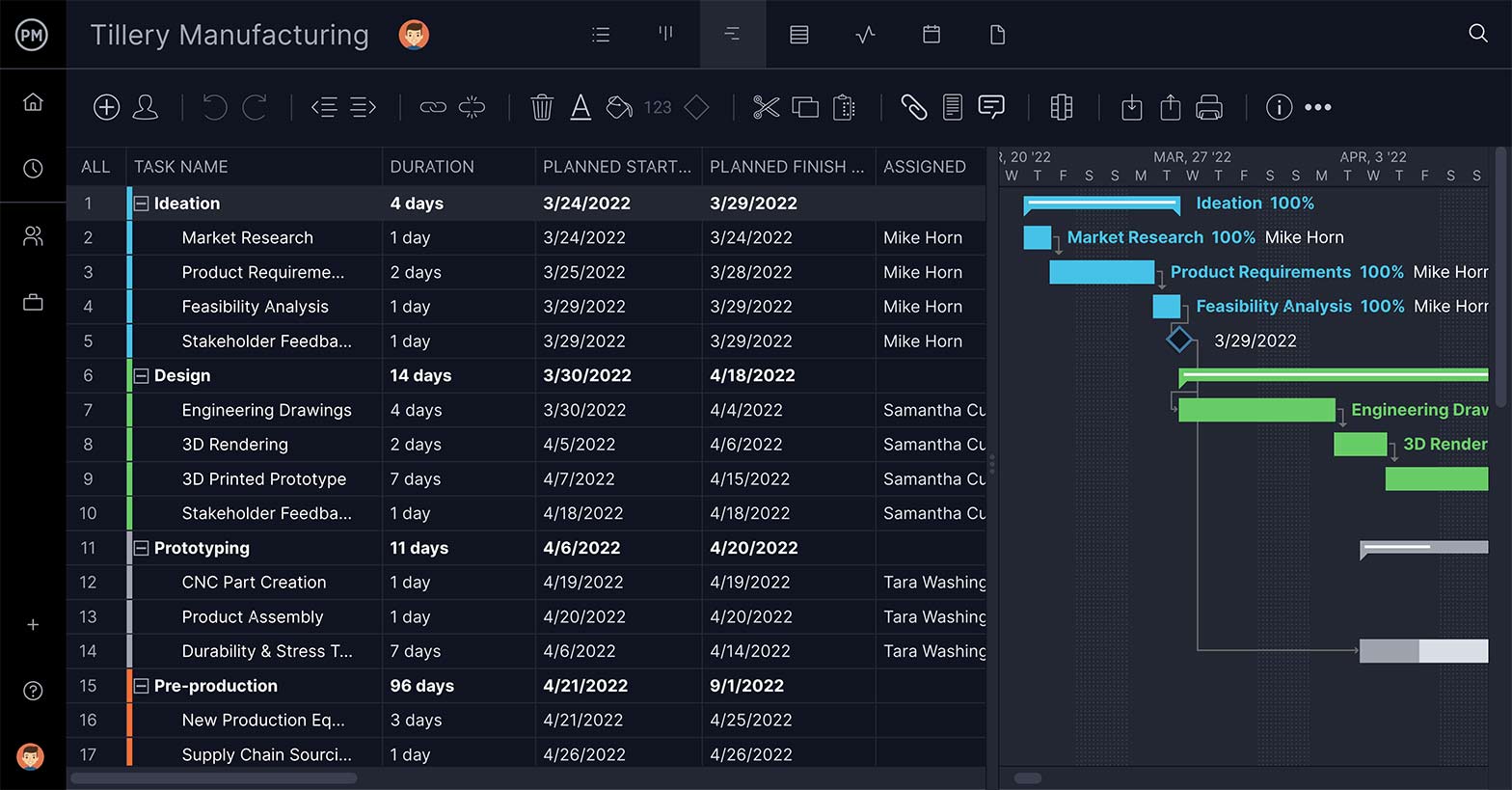Industrial processes are used in heavy manufacturing industries during large-scale projects. Having robust and efficient industrial processes is instrumental in a modern manufacturing business.
Let’s explore a deeper definition of industrial processes and then break it down into different types. We’ll also look at what materials are used in industrial processes, offer some examples and look at how manufacturing project management software can facilitate the process.
What Is an Industrial Process?
Industrial processes are a major part of heavy industry. They involve chemical, physical, electrical and mechanical steps that help in the manufacturing process. It is mostly used in large-scale manufacturing projects.
There are many industrial processes that companies use to make or shape a product. For example, there is composite activity, which uses many types of machinery, tools and equipment. There are also several layers of automation used that can include computers, robots or cloud-based technologies.
You can find the use of industrial processes in everything from batteries to automobile parts. Generally speaking, industrial processes are another method to take raw materials and transform them into finished products. But as manufacturing evolves, so do the techniques.
And as methods change, so do the tools that help control the process. ProjectManager is online project management software that manages various types of industrial processes. With multiple project views, managers and workers on the factory floor have the tools they need to manage their work and get transparency into the process, and make sure everyone has the resources they need to work at capacity. Get started with ProjectManager today for free.
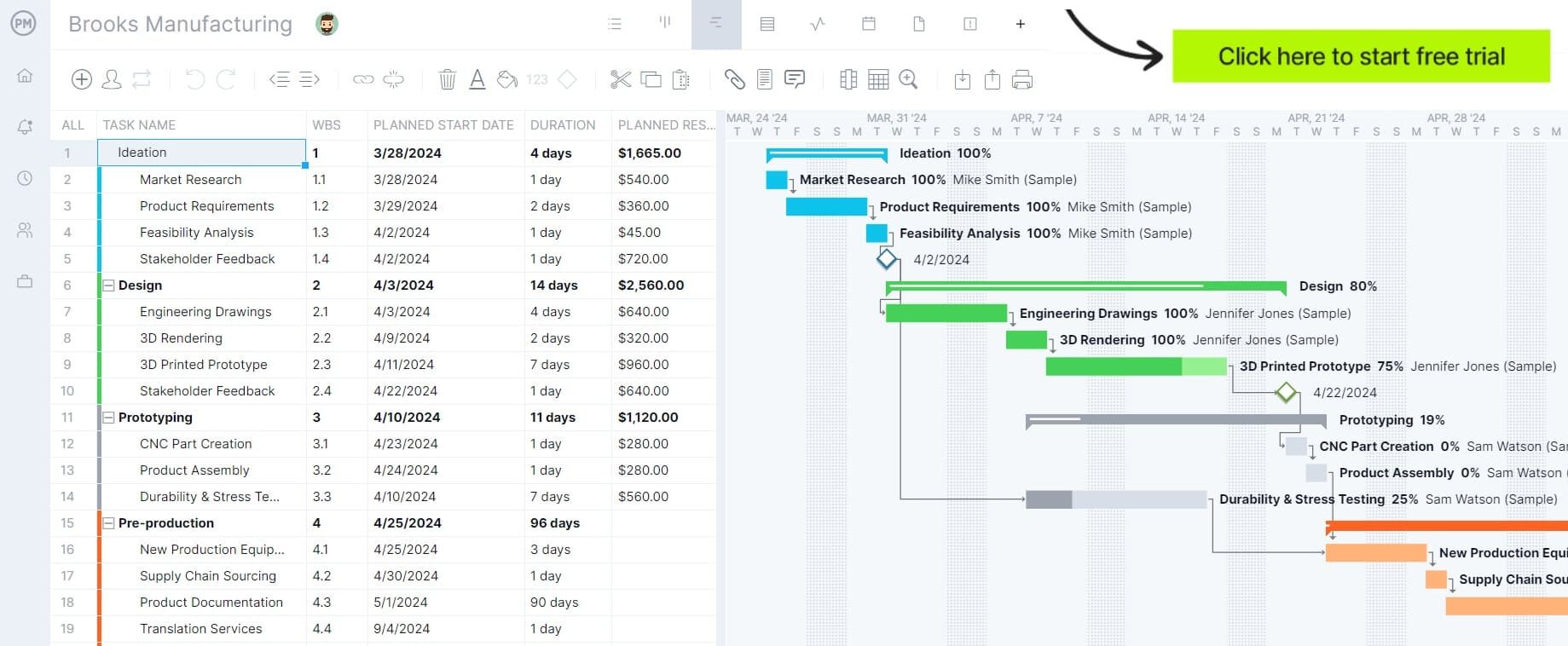
Types of Industrial Processes and Materials Used
While not an exhaustive list, the following are the more common types of manufacturing processes.
Chemical Processes
Several chemical processes create the necessary materials in manufacturing. These include cement, steel, aluminum and fertilizer. The chemical process for cement is called calcination. For steel, the process is called smelting, which is done inside a blast furnace. The Hall Heroult process is used to make aluminum, while the Haboer process produces fertilizer. There are also chemical processes to combine materials called pyroprocessing. Disinfection is a chemical treatment that kills bacteria and viruses.
Electrolysis
The use of electricity is another industrial process that affects materials and is used for plating and separating metals. These include gilding, electroplating, anodization, electrowinning, electropolishing, electrofocusing, electrolytic process, electrophoretic deposition, electrotyping and metalizing, platting and spin control.
Cutting
Cutting is an industrial process that is used in shearing, sawing, plasma cutting, water-jet cutting, oxyacetylene cutting, electrical discharge machining (EDM) and laser cutting. Machining also falls into this category type. It refers to the mechanical cutting and shaping of metal, which results in the loss of some material.
Molding
Here, materials are made by liquifying them and shaping them in molds as they cool and become solid. This is done in casting, sand casting, sintering, powder metallurgy, blow molding and compression molding.
Separation (Refining of Materials)
This process takes impure materials and purifies them by separation, which creates a product that can be used in production. This is done by reducing the size of particles by comminution, separating materials with froth flotation and the flotation process. There is also liquid-liquid extraction, which dissolves one substance in the other, and the Frasch process, which extracts molten sulfur from the ground.
There are, of course, many other examples of industrial processes from distillation, which purifies volatile substances through evaporation and condensation and metalworking. Metalworking, also called fabrication, includes processes such as smelting, forging, casting, steelmaking, progressive stamping, stamping, hydroforming, sandblasting, soldering, brazing, welding, tumble polishing, precipitation hardening, work hardening, case hardening, die-cutting and using an electric arc furnace.
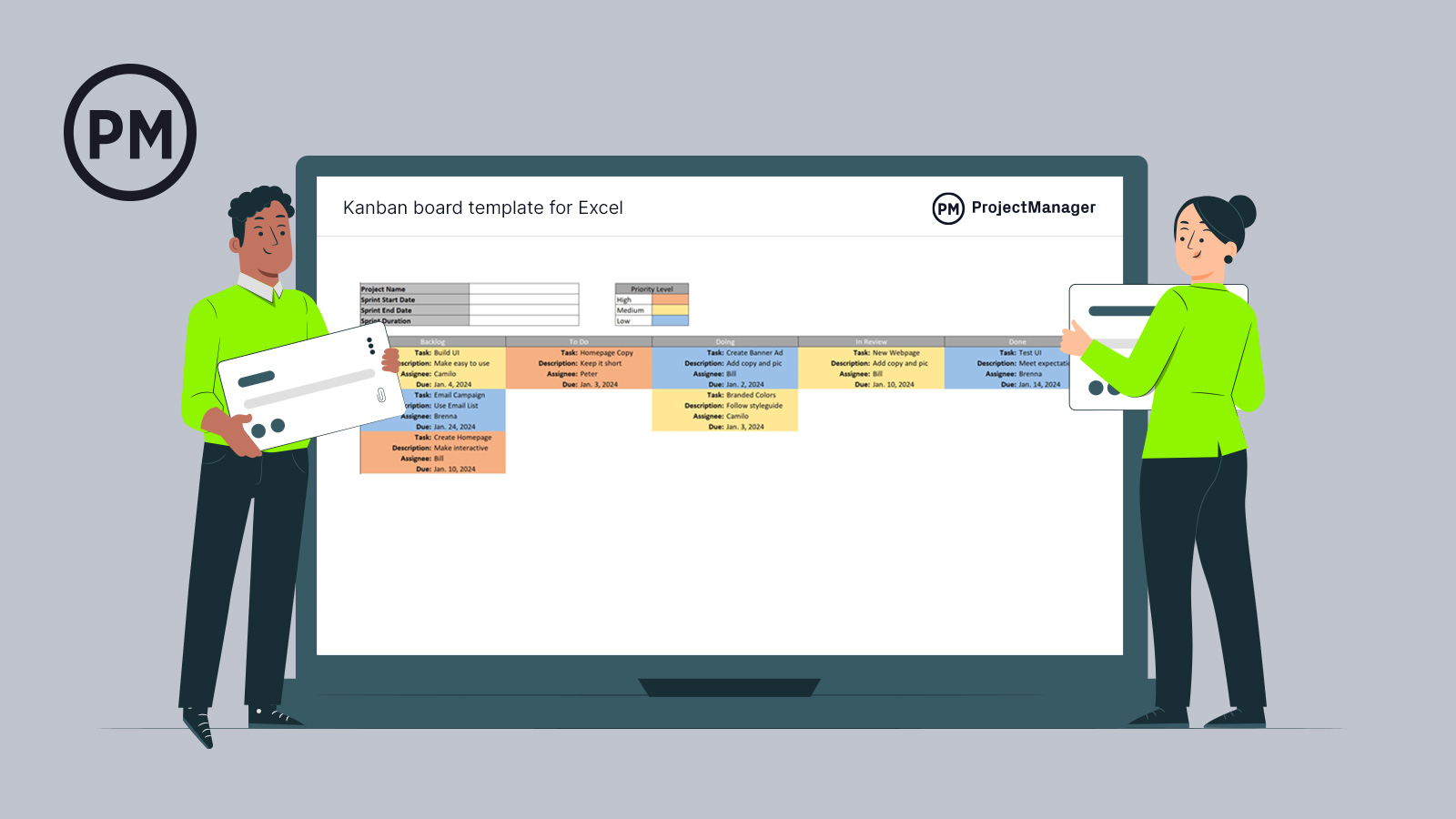
Get your free
Kanban Board Template
Use this free Kanban Board Template for Excel to manage your projects better.
Industrial Process Examples
Depending on the business, one kind of industrial process can be more effective than another. However, there are many different industrial process examples. The most common types of manufacturing processes include casting, molding, forming, joining, plating and additive. These can be found in the examples below.
Repetitive Manufacturing
This type of industrial manufacturing process is used when repeating the production of a product. It features production lines that are working on similar products or components all year round. This means there is little changeover or setup required, though production will reflect client demand. Companies that use this industrial process example include those that produce electronic goods, automotive and durable consumer goods, etc.
Job Shop Manufacturing
Here, parts are used in small-batch, custom products. These are made-to-order items for clients with workstations that are usually dedicated to one specific product. Think of a custom shoemaker or commercial printing press, which can change a product to match the client’s request. Some machine shops use this type of industrial process and make parts for the aviation industry. However, it also presents software development, helping with workflow. Some businesses move from job shop to repetitive manufacturing when they need to scale for greater productivity.
Discrete Manufacturing
This uses an assembly line, but with a greater variety than the repetitive manufacturing example. Therefore, it can have more recurrent changeover and variation in the process. This suits a manufacturer with many styles, sizes and modifications of their product. The downside is that production usually takes longer due to more setup and removal. This type of industrial process can be found in automobile and aircraft manufacturers, as well as those who create clothing, medical devices, toys and smartphones.

Batch Process Manufacturing
Driven by customer demand and the availability of raw materials, this type of manufacturing is similar to discrete and job-shop processes. Usually, this means that one batch is enough for client needs and when completed, the equipment is cleaned up and the company waits until a new need for product arises at which time they’ll start up production again. Industries that use this type of industrial manufacturing process include food production, newspaper printing, bookbinding and pharmaceuticals.
Continuous Process Manufacturing
As with repetitive manufacturing, continuous process manufacturing happens all the time. The two types of industrial manufacturing processes differ in that the raw materials are usually gases, powders, liquids or slurry. This example can be found in industries such as oil refining, metal smelting, paper production and food products that are similar to tomato sauce, juice and peanut butter.
3-D Printing
3-D printing uses several composites and materials, such as plastics and metals, to create three-dimensional goods layer by layer. This is done through digital means rather than physical labor or mechanization. Benefits to this type of manufacturing include reduced financial capital, raw materials and waste, though the process is expensive. It can also be used to create prototypes before committing to larger-scale projects and is used to make medical and dental devices, prosthetic limbs, firearms, shows, musical instruments and even buildings.
Kanban Board Template
This free kanban board template can help manufacturers monitor each stage of their production process. To do so, you can use kanban board columns to represent the industrial processes that are executed to manufacture a product such as cutting, molding and painting. Then you can use kanban cards to visualize production orders and then move them throughout the production stages as each step is completed.
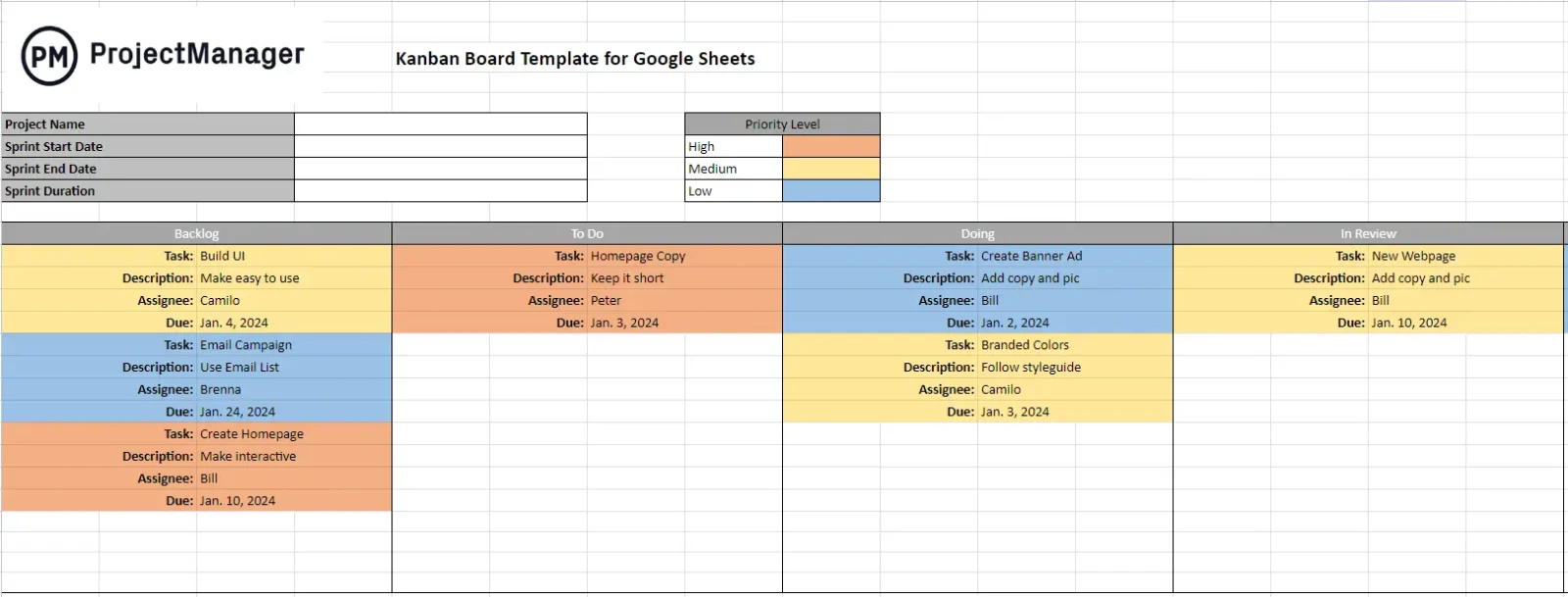
ProjectManager Helps Keep Track of Industrial Processes
To keep track of all the industrial processes and to make sure you’re on schedule and keep to your project, requires work and project management software. ProjectManager is a cloud-based tool that delivers real-time data so managers can better schedule, track and respond to issues as they arise in the manufacturing process.
Plan on Interactive Gantt Charts
Industrial processes work only when they are integrated into a production plan. Our Gantt chart organizes your work, links dependencies to avoid bottlenecks and sets milestones to help you track progress. Plus, you can filter for the critical path without having to do any complicated calculations. Then set a baseline to track the difference between your plan and actual progress in real time.
Monitor Progress and Performance With Real-Time Dashboards
To keep your manufacturing running on schedule, you need to know what’s happening when it happens. Our live dashboard captures real-time data and automatically shows you six project metrics in easy-to-read graphs and charts. Unlike inferior software, you don’t have to set up our dashboard. It’s ready when you are.

Get More Data With One-Click Reports
When the high-level view of a dashboard isn’t deep enough, one-click reports pull up more data on everything from time to timesheets. Each report can be filtered to show only the data you want to see. If you’re reporting to management, reports can be customized and delivered how they want to keep everyone updated.
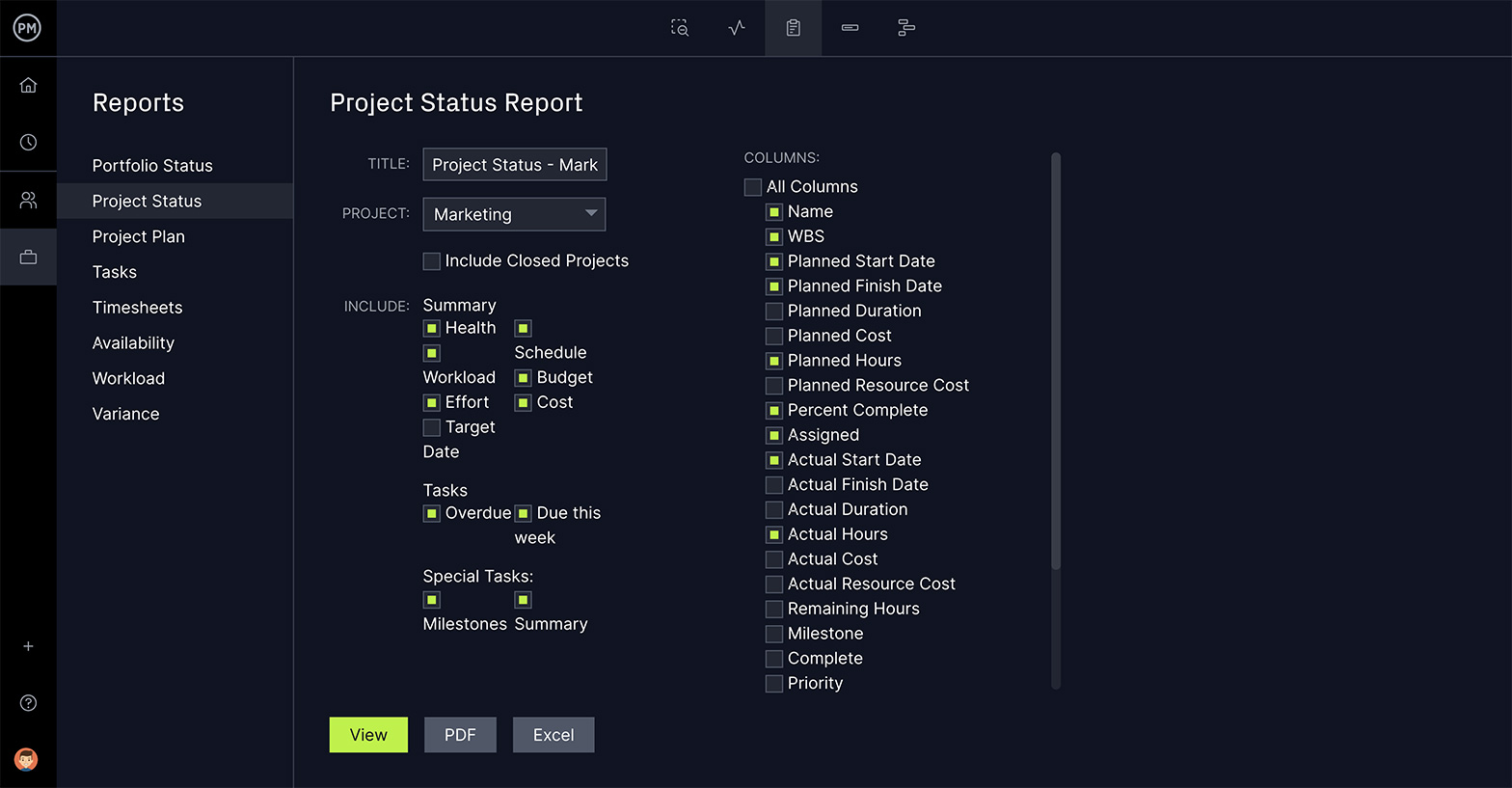
ProjectManager has workflow automation to streamline your production and task authorization to make sure that the quality of your products stays high. Add a collaborative platform that allows everyone to share plans, files and comments and you have the only software solution you’ll need.
ProjectManager is award-winning software that helps organize work and streamline processes to add efficiency and boost productivity. You get everything from resource and task management to roadmaps to manage all your projects in one place. Get started with ProjectManager today for free.

